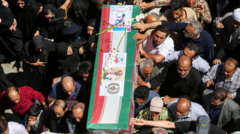Concerns mount as Iran's nuclear ambitions resurface post-violence, with the IAEA voicing hope for renewed diplomatic engagement despite rising tensions.
Iran Poised to Resume Uranium Enrichment Amid International Tensions

Iran Poised to Resume Uranium Enrichment Amid International Tensions
UN nuclear chief warns of potential uranium enrichment for weapons use in months following military strikes.
The head of the International Atomic Energy Agency (IAEA), Rafael Grossi, has indicated that Iran is capable of resuming uranium enrichment essential for developing a nuclear bomb within mere months. This announcement follows recent military actions by the United States, which targeted Iranian nuclear sites, resulting in significant but not complete damage, directly contradicting former President Donald Trump's assertions of total destruction.
The most recent strikes, conducted in conjunction with Israel, occurred on June 13, targeting critical facilities at Fordo, Natanz, and Isfahan amidst claims from Israel that Iran was nearing nuclear weapon capability. Grossi, speaking to CBS News, stated that "in a matter of months... a few cascades of centrifuges [could be] spinning and producing enriched uranium," underlining Iran's ongoing capacities.
Earlier assessments from the Pentagon echoed Grossi’s claims, suggesting that the airstrikes merely delayed Iran's nuclear program rather than dismantling it. In contrast, Trump claimed the attacks were a monumental success, asserting that the nuclear threats had been entirely neutralized.
While a ceasefire is currently in place between Iran and Israel, tension remains high. Trump indicated a willingness to consider further military action against Iran if credible information emerges regarding its uranium enrichment capabilities.
Iran has conveyed mixed reactions to the impact of these strikes. Supreme Leader Ayatollah Ali Khamenei has downplayed the effectiveness of the military actions, declaring them inconsequential, while Foreign Minister Abbas Araghchi has highlighted the "serious" damage inflicted on their infrastructure.
Iran's relationship with the IAEA has continued to sour, with parliament recently moving to suspend collaboration, alleging biases towards US and Israeli interests. This follows the IAEA's recent findings that marked Iran's first breach of non-proliferation obligations in two decades.
Despite the escalating tensions and Iran's firm stance that its nuclear program serves peaceful purposes, Grossi remains optimistic about future negotiations. He emphasized the necessity of a diplomatic resolution to the conflict, stating, “At the end of the day, this whole thing, after the military strikes, will have to have a long-lasting solution, which cannot be but a diplomatic one.”
Under the 2015 nuclear deal, Iran was authorized to enrich uranium only to 3.67% purity, necessary for commercial energy needs, and prohibited from conducting enrichment at its Fordo facility for 15 years. Following the US’s withdrawal from the agreement under Trump and subsequent reimplementation of sanctions, Iran has progressively flouted these limits, now reportedly possessing enough 60%-enriched uranium to construct multiple nuclear weapons.





















